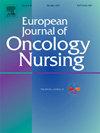Associations between postoperative pulmonary interventions based on enhanced recovery programs and outcomes in patients with lung cancer: A retrospective propensity score matching study
IF 2.7
3区 医学
Q1 NURSING
引用次数: 0
Abstract
Purpose
The purpose of the study was to assess the impact of postoperative pulmonary interventions based on enhanced recovery programs (PPIE) on patients undergoing lung cancer surgery using a retrospective propensity score matching (PSM).
Methods
The non-PPIE group only received the enhanced recovery programs, while the PPIE group received additional postoperative pulmonary interventions, including the active cycle of breathing techniques, oscillatory positive expiratory pressure therapy, incentive spirometry training, and early mobilization, conducted by nurses.
Results
656 patients with lung cancer were identified from January 2020 to December 2022. PSM resulted in 253 patients in each group. The PPIE group showed significant improvements in the presence of postoperative pulmonary complications within the first 30-day (4.7% vs. 11.9%, OR 0.37, 95% CI 0.19–0.74, p = 0.004) and in-hospital postoperative pulmonary complications (3.2% vs. 11.1%, OR 0.26, 95% CI 0.12–0.59, p = 0.001). PPIE was associated with an estimated median reduction in the postoperative hospital length of stay by 1 day (P < 0.001). Moreover, the duration of chest tube indwelling didn't significantly differ between groups (p = 0.394).
Conclusion
PPIE is beneficial to the outcomes of patients after lung cancer surgery, except for the duration of postoperative chest tube indwelling. Postoperative pulmonary interventions could be integrated into the ERPs to enhance rehabilitation. Moreover, nurses play a role in facilitating the recovery of patients who have undergone lung cancer surgery.
求助全文
约1分钟内获得全文
求助全文
来源期刊
CiteScore
4.40
自引率
3.60%
发文量
109
审稿时长
57 days
期刊介绍:
The European Journal of Oncology Nursing is an international journal which publishes research of direct relevance to patient care, nurse education, management and policy development. EJON is proud to be the official journal of the European Oncology Nursing Society.
The journal publishes the following types of papers:
• Original research articles
• Review articles

 求助内容:
求助内容: 应助结果提醒方式:
应助结果提醒方式:


